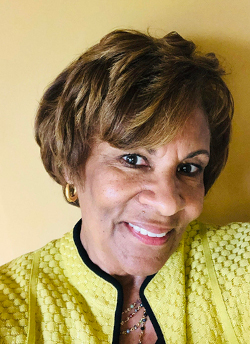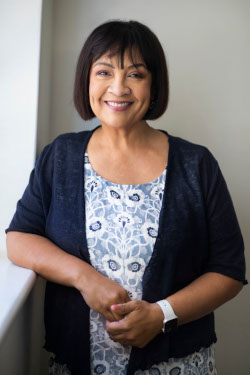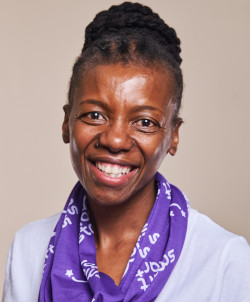Phumi Nhlapo, Chief Operations Officer at the Desmond & Leah Tutu Legacy Foundation.
The Covid-19 pandemic and government lockdowns have exacerbated what is now being called the “shadow pandemic” of women increasingly being abused — sexually, physically, emotionally and economically. The pay gap has increased in many instances, and recent abortion legislation in the US means that there has been regression in the field of reproductive justice policies.
In recognition of Leah Tutu’s Birthday and Domestic Violence Awareness month, the Desmond & Leah Tutu Legacy Foundation (DLTLF) and Shared Interest co-hosted a webinar about the economic and domestic threats to women’s empowerment.
 Dr Cynthia Spence, Associate Professor of Sociology, Spelman College.
Dr Cynthia Spence, Associate Professor of Sociology, Spelman College.
Solutions offered by the speakers included recognising the importance of paying childcare workers and paying them more, and training women in the growing fields of the green economy and digitisation, to empower them and allow them to enter and flourish in the workplace.
Facilitator Phumi Nhlapo, Chief Operations Officer at DLTLF, opened proceedings, introduced the speakers and provided a brief outline of the webinar. She asked Dr Cynthia Spence, Associate Professor of Sociology, Spelman College, how the Covid-19 pandemic had affected women.
Spence said that violence surrounds us, whether it is in the US or South Africa, and it is celebrated by the media. Patriarchy is still rampant, along with many other structures that oppress women. The pandemic exacerbated loss of income, and women have traditionally earned less than men, across all sectors, creating dependence on men. There was mass income loss during the lockdowns, which increased frustration and violence in the home.
Women could also not leave home to access shelters because of social distancing, so they had fewer support structures.
Domestic violence costs the South African state between R22-billion and R28-billion a year, calculated on cost of service at facilities that treat women for physical violence, and in loss of productivity. There is also the cost of psychological stress caused by domestic violence, which is very difficult to calculate in financial terms.
 Lea Conrad, Managing Director at Conrad Advisory.
Lea Conrad, Managing Director at Conrad Advisory.
Lea Conrad, Managing Director at Conrad Advisory, was asked what barriers women encounter in making an impact on society. Conrad said that harnessing the economic potential of women should be on the global agenda, as it is “as important as working to control climate change”. Women typically invest more of what they earn into their families and communities — up to 90%, compared to men, who invest between 30% and 40% — so investing in training women empowers us all.
Cultural and other barriers
There are many obstacles to women being seen on the same level as men, due to cultural factors such as patriarchy. Despite the fact that women generally work harder than men to prove their competence and to dispel gender stereotypes, they are seldom rewarded equally. Other barriers are access to affordable childcare options; the widening gender pay gap; access to financial support; and access to adequate skills training. These barriers hold back women who are trying to open and run their own businesses, or climb the corporate ladder.
Nhlapo asked Sane Mdlalose, Chief Growth Officer at SmartStart, about access to childcare. Mdlalose said that in South Africa the childcare sector is led by the market, which means that those with more resources have more access to services; those without services often have no access. Of the 1.3-million children who do not have access to childcare or early childhood development (ECD) services, 67% are from the most vulnerable communities.
SmartStart tries to overcome this by making childcare affordable and accessible to poor communities. This allows women who are unemployed or underemployed to enter the workforce, while safe spaces are available to their children, who get quality care and thus perform better at school.
 Sane Mdlalose, Chief Growth Officer at SmartStart.
Sane Mdlalose, Chief Growth Officer at SmartStart.
The caregivers, 85% of whom are women in this sector, are also economically empowered — many women perform this service currently without being paid — so there is a triple impact. Girls typically receive less education than boys, so training women to become caregivers allows them to participate in the economy.
What intersectional changes should be made by institutions to ensure that women thrive in society, Nhlapo asked Spence. She replied that training women in entrepreneurship is vital.
For example, in the US, black women now make up the largest demographic in entrepreneurship training projects. This increases the agency of women to make important decisions in their lives. Legislators must be pushed to address the pay gap, which places women in positions of dependency, and forces them to endure emotional and physical abuse. The government should be subsidising childcare, while those who work with, and raise, others’ children should be valued more.
Women should be educated so they can achieve social mobility — government subsidies in this regard are essential. There should be policies to protect and empower women in the workplace as they bring added value to the organisations they work for.
Healthcare should be available to more people, noting that there has been regression in the field of reproductive justice policies.
Greater agency for women must be addressed at all levels, and caregiving must be monetised. It will depend largely on activism to change policies, and men can play a role in this too.
Women and entrepreneurship
According to the Mastercard Index of Women Entrepreneurs, entrepreneurship among women is increasing in South Africa. Conrad said that much of this is necessity based, which, in the poor economic climate, reflects the tenacity of South African women.
The rapid increase in digitisation means there is a great need for digital training. Another area of growth is the green economy, and many opportunities exist there, for instance in installing solar panels. There is a lot of talk about the “just economy” and we must ensure that women must be trained up so they can participate in the green economy.
Women entrepreneurs must be able to improve their businesses and scale them up, which requires greater access to finances. “Courageous conversations” must be had about cultural norms that hold women back, to unlock their full potential.
Nhlapo asked Mdlalose, how we can elevate care work, so it can be seen as valuable, and worth paying for? She said the issue initially, when children are up to two years old, is whether the parents have the resources to pay for childcare. When children are three to five, the value of quality teaching and what to pay for it comes to the fore. If parents can see results, they are more willing to pay, but again, they often cannot afford a good education.
The government must be encouraged to provide childcare subsidies, while NGOs must focus on providing training and credentials, so that childminders can deliver quality childcare.
Closing remarks
On a positive note, there are more sites and NGOs like SmartStart that are engaging with the government on policy changes, which is expressing more willingness to listen to their pleas, said Mdlalose. There is a need for more private-public partnerships, and corporates must also step up to the plate.
Spence said there is more light in the US context, as the infrastructure is in place for empowering women. Education is the key, and the private sector must be brought on board to address changing what seem to be impenetrable structures. We know what the problems are, so how do we bring about solutions?
Conrad said there is always a light at the end of the tunnel! Collective conversations such as this one is where one starts, and collaboration is the key.
Nhlapo closed proceedings, saying that “The Arch” should have the final word. She then played a video with the late Desmond Tutu, who reminded us that “Meaningful change is made up of a million ripples, which builds up. We CAN change the world!”
— Derek Davey
